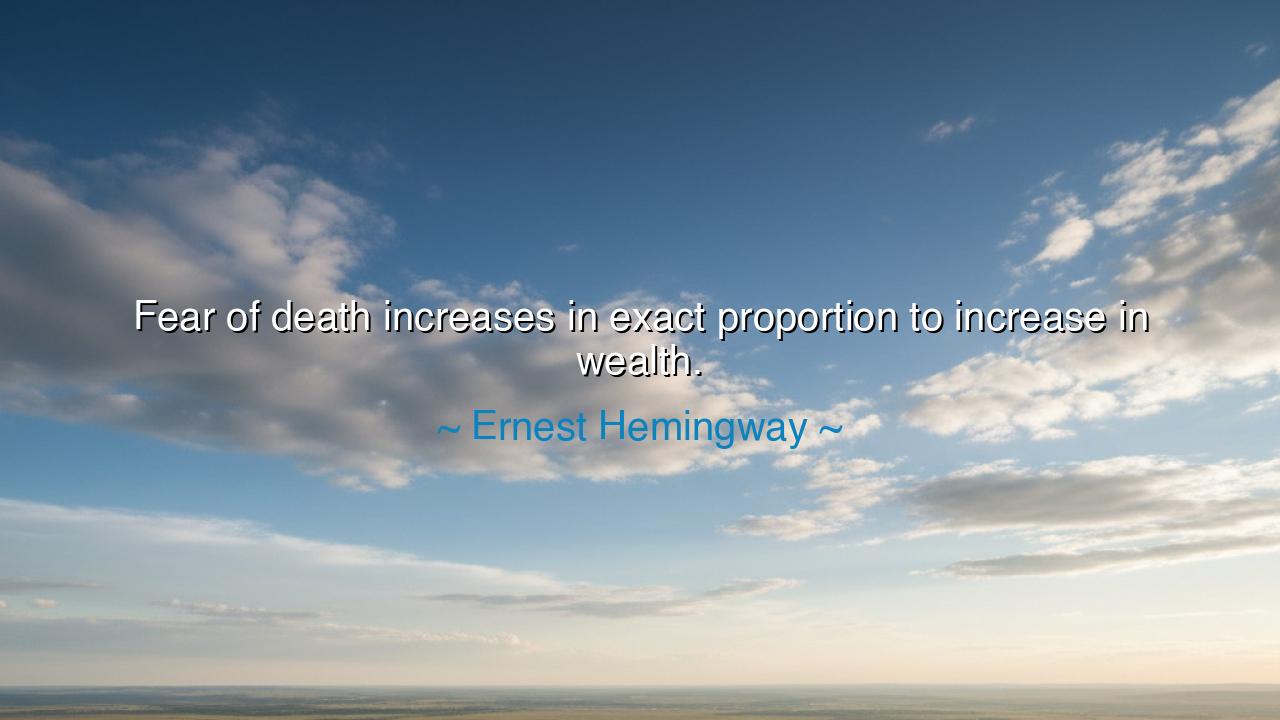
Fear of death increases in exact proportion to increase in






The words of Ernest Hemingway — “Fear of death increases in exact proportion to increase in wealth.” — are not the musings of a cynic, but the revelation of a man who had lived close to both poverty and glory, and who had seen the true nature of human desire. In this single line, Hemingway distills an ancient paradox: that the more we possess, the more tightly we cling to life, and the more fiercely we dread its loss. To those who have little, death is an old acquaintance — a shadow familiar and accepted. But to those who accumulate riches, honors, and comforts, death becomes the thief waiting at the door. For the wealthy man has more to lose — and therefore, less peace.
To understand this quote, one must know the world that shaped Hemingway’s mind. He lived through war, fame, and ruin, always straddling the edge between life and death. As a young man, he drove ambulances during the First World War and saw men die for ideals, for duty, or for nothing at all. Later, as a journalist and adventurer, he hunted, fished, and fought — always courting danger to feel the pulse of existence. Yet amid his rugged courage lay a profound observation: that those who have come closest to death often fear it the least. In contrast, those who build their lives around safety and possession grow timid, terrified that one day the fragile fortress of their wealth will crumble into dust.
This truth was known even to the ancients. Socrates, condemned to drink the hemlock, met death with serenity, saying that it was either dreamless sleep or the beginning of wisdom. He had no treasure to guard, no empire to defend — only his conscience, which he knew to be free. Meanwhile, kings and emperors throughout history, surrounded by gold and luxury, have gone mad with fear at the thought of mortality. Alexander the Great, who conquered the known world, wept when he realized that all his conquests could not buy him immortality. In this way, Hemingway speaks as one in a long line of philosophers and poets who understood that wealth multiplies attachment, and attachment multiplies suffering.
There is a moral clarity in Hemingway’s insight. He does not condemn wealth itself, but the illusion that it brings control over life and death. When one begins to measure the worth of existence in material terms — in estates, possessions, or prestige — one begins to dread the moment when all must be surrendered. Death, to such a person, is not merely the end of breath, but the annihilation of meaning, for meaning was never rooted in the eternal but in the temporary. The wise, however, understand that death takes nothing from those who have lived rightly, for their treasure lies in courage, kindness, and the endurance of the spirit.
History again offers its witnesses. Consider Marcus Aurelius, the philosopher-emperor of Rome, who ruled the greatest empire of his age. Surrounded by power and luxury, he wrote in his meditations: “You could leave life right now. Let that determine what you do and say and think.” He saw clearly that wealth and position were transient — and that fear of death was a sign of spiritual poverty, not strength. In contrast, the miser, the tyrant, and the greedy all share the same torment: the knowledge that their riches cannot buy them one more heartbeat.
Hemingway himself lived and died by this creed. He was a man who loved the rawness of life — the hunt, the sea, the battlefield — but who also carried within him the melancholy of knowing that all beauty fades. His quote is not merely a warning to the rich; it is a call to live unburdened, to hold lightly what the world gives, and to measure wealth not in possessions, but in moments of courage and authenticity. To fear death less, one must first cling less to illusion — to accept that all things are lent to us, never owned.
The lesson of this quote is as simple as it is profound: learn to live without chains. Do not let wealth, comfort, or status deceive you into thinking you can outlast time. Live instead with a heart prepared to lose, and you will discover a freedom that no riches can buy. Seek experiences that awaken the soul, not possessions that suffocate it. Give generously, love fiercely, and remember daily that life is precious precisely because it ends.
So let Hemingway’s words be carved upon your heart: “Fear of death increases in exact proportion to increase in wealth.” For the man who owns little and loves deeply walks in peace, while the man who owns much and loves little lives in quiet terror. The answer, then, is not to curse wealth, but to master it — to make it a servant, not a master. Only when you can look upon your possessions and say, “These can go, but I remain,” will you truly be rich — rich in spirit, courage, and freedom — and unafraid when death at last comes calling.






AAdministratorAdministrator
Welcome, honored guests. Please leave a comment, we will respond soon